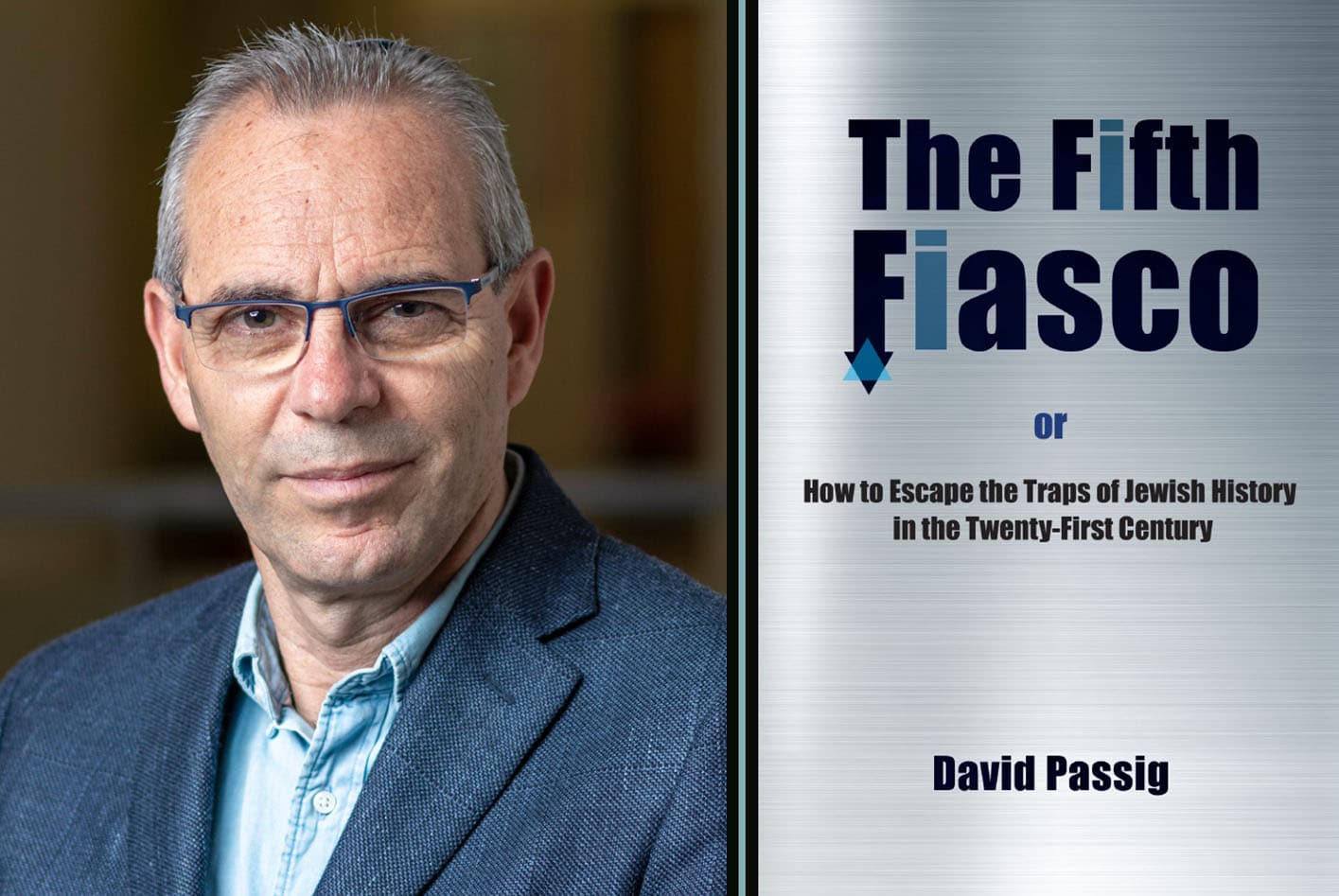 David Passig
David Passig Will the third Jewish Commonwealth fare any differently than two destroyed temples? In the wake of the 2020 pandemic and most recent Gaza conflict, perhaps this question is as relevant as ever. “The Fifth Fiasco” by David Passig is the author’s latest foray into exploring a Jewish future. This informative and fascinating tour de force first looks back to Jewish history in order to project a more desirable Jewish future.
Externally, the danger of physical and existential threats to the Jewish State and Diaspora community can seem overwhelming—from resurgent antisemitism in the Diaspora to the possibility of a nuclear war with Iran in Israel. Internally, disunity can seem even more daunting. From an Israel-Diaspora dichotomy to Haredi and Reform iterations of Judaism, we are all too often reminded just how fragile is the social and religious fabric of our people in the 21st century. Is there hope to avoid what Passig calls the “Fifth Fiasco,” which he describes as a series of avoidable catastrophes, and ensure Jewish survival and success?
Known widely in Israel, English readers have only just begun to be exposed to Passig’s work. Several years ago, I encountered Passig’s earlier book “2048” (2013), the story of a hypothetical future for the state of Israel’s 100th birthday. Since then the author and futurist has been busy with activities including posting fascinating YouTube videos, heading Bar-Ilan’s Virtual Reality Laboratories, and publishing papers on a variety of topics that seem to border on science fiction. For example, his “Improving Children’s Cognitive Modifiability by Dynamic Assessment in 3D Immersive Virtual Reality Environments” sounds like something straight out of a “Matrix” film. While “2048” focuses on different probable and possible futures for the Jewish State, “The Fifth Fiasco” takes the next step and discusses the possibility of crafting a preferable future for the entire Jewish people.
Continuing his important work of Jewish prognostication, Passig has created another page turner. This time, the futurist first takes us back in time before pushing us forward. In his words: “The past is the most powerful source of strength available to intelligent beings.” His historical overview includes a review of not only Jewish history, but world history as well. From Sargon the King of ancient Sumer to Lenin and the Bolsheviks, Passig parses these narratives to synthesize “the unforgiving chaos of human history” to learn how the Jewish people can succeed in the 21st century and beyond.
Continuing his important work of Jewish prognostication, Passig has created another page turner.
Jewish historians often chronicled Jewish catastrophes. For example in the wake of the Spanish Expulsion and the Holocaust, a whole genre of literature exists that recounts a sad past. “The Fifth Fiasco” does the same but with a contemporary lens for realpolitik and cutting-edge scientific methodologies. While some Jewish traditionalists might believe that fate and ritual observances alone can break the seemingly endless destructive cycles of the past, Passig advocates a pragmatic approach in which we overcome our obstacles and realize opportunities.
For example, what were the religious and political issues that led to a civil war in the Book of Kings? Conversely, how was a similar civil war averted in the Book of Judges? Passig believes these narratives of the past contain a recipe to mend contemporary differences of religion and politics within the Jewish community. By viewing Jewish history in a pattern of five distinct eras, we can all learn from our past mistakes.
The book is a treat for both laymen and those more acquainted with Jewish history. Along the way, the reader will learn a great deal about future studies, psychology, and “counterfactual” retellings of history by utilizing “process-based historical” thinking. These methods help us find “pieces of the puzzle that were previously hidden … with a view to enabling us to break the vicious cycles … and conceive of a better future as a promising anchor.”
A solution emphasized by Passig is the central role and contribution of women. While men tend to solve problems with a “left- brained” orientation, women have the ability to problem solve using “right- brained” solutions that utilize creativity—an approach that must be explored to a greater extent to solve larger societal issues. Other interesting interludes into arguments for the importance of territorial Judaism and historical pedagogy make for a stimulating read. For example, the author argues that if we teach students that the Holocaust happened because of Hitler, why bother teaching history at all? For Passig, a more useful approach is to explain the social, political and economic realities of those times as a way to learn about practical solutions for the present and future.
Passig challenges his reader to consider what might mend our internal differences in order to ensure outside forces do not once again destroy our Jewish State. While some of his conclusions might ultimately be rejected by readers, his masterful analysis provides space to explore a Jewish historical narrative in broader and more useful terms that will dominate the topic of many discussions in years to come. With 2020 now in the past, perhaps one thing we all can agree on is to be optimistic for a better year ahead.
Dr. Murray Mizrachi is a business professor at the Murray Koppelman School of Business at CUNY. His advisory firm, Murray Mizrachi Consulting LLC, is based in New York City where he resides with his family.






















 More news and opinions than at a Shabbat dinner, right in your inbox.
More news and opinions than at a Shabbat dinner, right in your inbox.